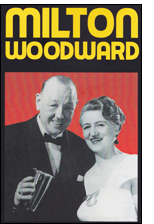![]()
![]()
|
|
Milton Woodward: The Magician that Changed Magic
by David Budd
Brian Lead
 Milton
Woodward may well be the most significant magician you have never heard of.
Milton
Woodward may well be the most significant magician you have never heard of.
Although he never headlined with his own show, Woodward supported many of the
top stars of his day. He was also mentor to the late David Budd, who had been
writing this book on him for many years. Whenever I asked David about his
progress, he would say “I’ve written another paragraph!”
Legendary Abracadabra editor Donald Bevan inherited, via David’s daughter
Janet, a pile of David’s notes, and has done a wonderful job in collating them.
David had a distinctive, quirky style which Donald has resisted the temptation
to modify, giving the impression that David is chatting to the reader. Indeed,
the book is peppered with fascinating asides, digressions and ‘notes from the
author’. For example, one of Woodward’s first encounters with magic was when, as
a young boy, he bumped into David Devant in the street when he was showing off
his coin-producing wand.
The writer deals simply but sensitively with the decline into alcoholism and
debt of Woodward’s wife, Stella, and the break-up of their marriage; daughters
Betty and Sheila choosing to stay with their father and Betty joining him on
stage as a ’page boy’ assistant. Indeed, acknowledging the influence of Cardini,
she would emulate Swan by opening the act with the announcement “Paging Mr
Woodward.”
Woodward teamed up with assistant Millicent Cooper, a proficient singer and
dancer, who joined his show in 1934 – a relationship which would last for thirty
years. Eventually, Millicent produced and directed the act. By all accounts, she
was a feisty character who controlled the business side of things and instilled
fear into stage managers, even causing a strike on one occasion. As David
remarks: “On stage she was a graceful, good-looking young woman, but often
back-stage I saw her wading into stage-hands who had not pleased her, with
language which would have made the toughest navvy shudder.” She kept Milton in
check, selling his doves and rabbits when she felt they were not being treated
properly . . . and her purple hair certainly raised eyebrows in Leamington Spa
in the 1930s.
Although Millicent claimed to make 18 costume changes in 9 minutes, press
reviews record 18 in 14 minutes; including three during the curtain calls alone.
Whatever the case, this brought her into conflict with Lewis Davenport, who
protested that she had stolen the idea behind his colour-changing waistcoats,
used to punctuate his tricks.
The book contains some priceless anecdotes – the occasion when Millicent almost
rolled off a steeply raked stage in a cabinet . . . police being involved when
an audience member claimed that a ring of inferior quality had been returned to
her at the end of a trick . . . Levante plunging manacled into a river to find
himself up to his knees in muddy water. The ring incident concerned a routine in
which three borrowed rings were hammered out of shape to fit into the muzzle of
a revolver and then fired into a suspended nest of boxes. The rings were
ultimately returned unharmed, along with gifts of chocolates and cigarettes.
Another amusing anecdote concerns a performance on the British Ring gala show at
Buxton Opera House in 1937. Woodward’s swirling cloak knocked over a stack of
goldfish bowls, complete with water and fish. The audience’s alarm was increased
when Millicent not only ignored the stranded goldfish but actually stood on
them. They were, of course, slices of carrot.
Ironically, safety curtains are capable of causing serious damage owing to the
heavy metal used. The career of Ali Bey was curtailed when he had an accident
involving such a curtain, and Millicent was injured when she was hit on the
shoulder by one as it descended.
We learn that Milton and Millicent always stayed in the best hotels rather than
theatrical ’digs’, and so did not mix much with their peers. As David remarks:
“Such accommodation was not to ‘show off’, but if you claim to be a ‘World
Master of Magic’ you have an image to live up to.”
During the first part of his career, Woodward ended his act with a Garden of
Flowers finale, the whole stage full of colourful blooms and parasols. It took
him all the time he had between performances to re-set. Millicent appeared via a
Doll’s House illusion, a statuette was transformed into a living lady and a
wartime land girl waving a spade appeared to represent the Queen of Spades! This
floral presentation inspired David Budd’s own act, Magic in Lavender, devised
with his wife Rita. It took them all over the UK to magic clubs and dinners,
banquets and conventions, plus occasional journeys overseas.
In 1950, Milton and Millie introduced the more compact Woodward’s Wonder Bar,
featuring a range of liquid effects built around the ‘Any Drink Called For’
concept. The innovation proved popular with audiences – apart from teetotallers
such as Mr George Payne who objected to its being presented as family
entertainment and threatened to stop the act. This no doubt provided valuable
publicity for Woodward and Company.
Born on 2nd April 1900, Milton Woodward died on 25th February 1964 at the age of
63, while in office as President of the British Ring of the International
Brotherhood of Magicians.
David Budd’s book is a fitting memorial, and a significant contribution to magic
history. It has been attractively set out by John Hawkins, who is responsible
for the look of the Key Ring and Magic Circular magazines, and books such as the
celebration of Jon Gresham by Eddie Dawes and Jon Marshall.
The book is available direct from David’s daughter, Janet: mwoodbud@gmail.com,
or 07856 862977 for enquiries. £16 plus £3.95 postage.
© Brian Lead, June 2022